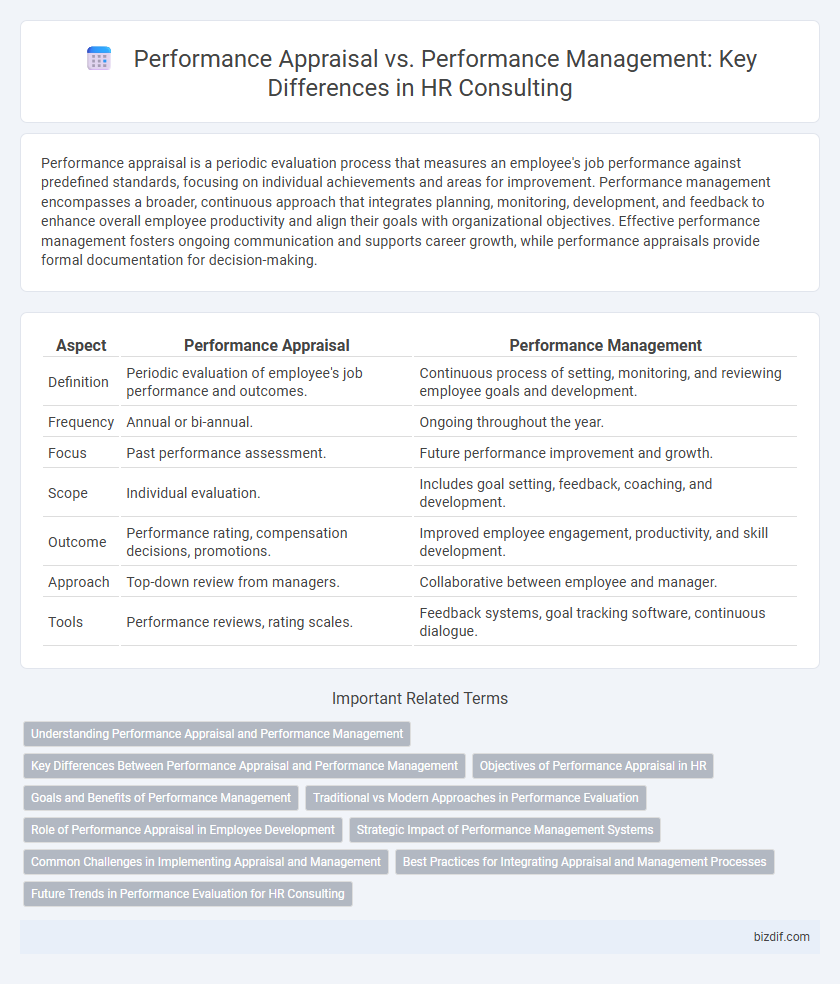Performance appraisal is a periodic evaluation process that measures an employee's job performance against predefined standards, focusing on individual achievements and areas for improvement. Performance management encompasses a broader, continuous approach that integrates planning, monitoring, development, and feedback to enhance overall employee productivity and align their goals with organizational objectives. Effective performance management fosters ongoing communication and supports career growth, while performance appraisals provide formal documentation for decision-making.
Table of Comparison
| Aspect | Performance Appraisal | Performance Management |
|---|---|---|
| Definition | Periodic evaluation of employee's job performance and outcomes. | Continuous process of setting, monitoring, and reviewing employee goals and development. |
| Frequency | Annual or bi-annual. | Ongoing throughout the year. |
| Focus | Past performance assessment. | Future performance improvement and growth. |
| Scope | Individual evaluation. | Includes goal setting, feedback, coaching, and development. |
| Outcome | Performance rating, compensation decisions, promotions. | Improved employee engagement, productivity, and skill development. |
| Approach | Top-down review from managers. | Collaborative between employee and manager. |
| Tools | Performance reviews, rating scales. | Feedback systems, goal tracking software, continuous dialogue. |
Understanding Performance Appraisal and Performance Management
Performance appraisal is a systematic evaluation of an employee's job performance at a specific point in time, focusing on outcomes, skills, and behaviors to inform decisions about promotions, compensation, or development needs. Performance management is a continuous process that encompasses goal setting, coaching, feedback, and development, aiming to align individual performance with organizational objectives over time. Understanding the distinction highlights that performance appraisal is a component of the broader performance management system, which fosters ongoing employee growth and organizational success.
Key Differences Between Performance Appraisal and Performance Management
Performance appraisal is a periodic evaluation of an employee's past performance, typically conducted annually, focusing on assessing individual achievements against set objectives. In contrast, performance management is an ongoing process involving continuous feedback, goal setting, development, and coaching to enhance employee performance and align it with organizational objectives. Key differences include the appraisal's retrospective nature versus management's proactive, continuous approach, with performance management emphasizing employee growth and strategic alignment beyond mere evaluation.
Objectives of Performance Appraisal in HR
Performance appraisal in HR aims to objectively assess employee performance against predefined criteria to identify strengths, areas for improvement, and development needs. It provides a structured basis for recognizing achievements, setting future goals, and aligning individual contributions with organizational objectives. The process supports informed decision-making regarding promotions, compensation, and training, enhancing overall workforce effectiveness.
Goals and Benefits of Performance Management
Performance Management emphasizes continuous goal setting and real-time feedback, fostering employee development and aligning individual objectives with organizational strategy. It promotes enhanced productivity, increased employee engagement, and improved business outcomes through ongoing performance tracking and coaching. Unlike traditional performance appraisal, it drives proactive growth rather than periodic evaluation.
Traditional vs Modern Approaches in Performance Evaluation
Traditional performance appraisal relies on annual reviews and standardized rating scales, often leading to biased and infrequent feedback. Modern performance management emphasizes continuous, real-time feedback supported by data analytics, goal alignment, and employee development. Integrating technology and ongoing communication enhances accuracy and drives performance improvement and engagement.
Role of Performance Appraisal in Employee Development
Performance appraisal serves as a critical tool within performance management by systematically evaluating employee achievements against set objectives, providing essential feedback for skills enhancement and career growth. It identifies strengths and areas for improvement, enabling HR professionals to design targeted development programs and foster continuous learning. Effective performance appraisals align individual goals with organizational strategy, driving employee engagement and improved productivity.
Strategic Impact of Performance Management Systems
Performance Management Systems drive strategic impact by aligning employee goals with organizational objectives, enhancing overall productivity and agility. These systems provide continuous feedback and development opportunities, facilitating proactive talent management and succession planning. Effective performance management fosters a culture of accountability and engagement, crucial for sustaining competitive advantage and achieving long-term business success.
Common Challenges in Implementing Appraisal and Management
Common challenges in implementing performance appraisal and management include inconsistent evaluation criteria, lack of employee engagement, and inadequate training for managers, leading to biased or ineffective assessments. Organizational resistance and unclear communication about performance expectations often result in misunderstandings and reduced motivation. Overcoming these obstacles requires systematic processes and continuous feedback mechanisms to align individual goals with business objectives.
Best Practices for Integrating Appraisal and Management Processes
Integrating performance appraisal with performance management enhances employee development and organizational effectiveness by aligning goal-setting, continuous feedback, and evaluation metrics in a cohesive framework. Best practices include establishing clear performance criteria, leveraging real-time data analytics for ongoing assessments, and fostering transparent communication between managers and employees to address skill gaps proactively. Implementing a unified digital platform streamlines documentation, supports unbiased appraisals, and drives strategic talent management initiatives across departments.
Future Trends in Performance Evaluation for HR Consulting
Future trends in performance evaluation emphasize continuous feedback and real-time data analytics to enhance employee development and organizational agility. Advanced AI-driven tools enable personalized performance insights, fostering a culture of ongoing improvement rather than periodic reviews. Integrating these innovations within HR consulting frameworks streamlines talent management and boosts strategic decision-making for sustained workforce effectiveness.
Performance Appraisal vs Performance Management Infographic

 bizdif.com
bizdif.com